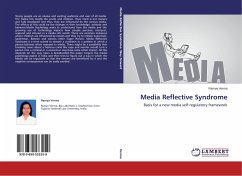Young people are an elusive and exciting audience and user of all media. The media hits mostly the youth and children. Their mind is not mature and fully developed and thus, they are influenced by the various media. The effects of this could be the changes in their knowledge, attitude and behavior.Media Psychology seeks to understand how the media and the growing use of technology impacts how people perceive, interpret, respond and interact in a media rich world. There are common instances where children are influenced by movies and they try to imitate Superman, Spiderman, Batman and various other Super Heroes. Media Reflective Syndrome is a term coined to denote a condition or a pattern in which a person behaves when exposed to media. There might be a possibility that breaking news about a heinous crime like rape and murder would turn a person into a criminal or a coward or may have some other impact. All this depends on the way news is broadcasted.This paper targets the media psychology aspect in India and then tries to figure out a way in which the Media can be regulated so that the viewers are benefitted by it and the negative consequences can be easily avoided.
Bitte wählen Sie Ihr Anliegen aus.
Rechnungen
Retourenschein anfordern
Bestellstatus
Storno








